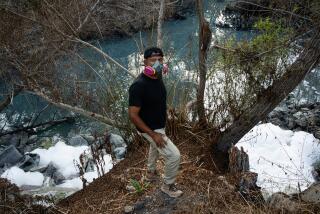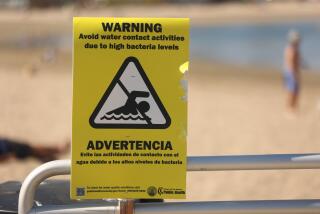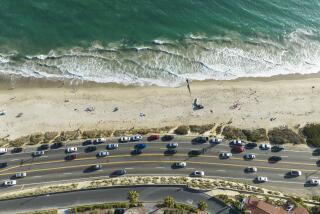County Assails City Over Sewage Spills at Beaches
Angered by sewage spills that closed local beaches the past two weekends, the Los Angeles County Board of Supervisors on Tuesday called for the city to stop leaks from its sewer system and to reimburse the county for cleanup costs.
The supervisors also asked county health officials to determine whether an ordinance is needed to prohibit bathers and swimmers from using public beaches after a spill.
The action Tuesday was the loudest complaint yet by the Board of Supervisors over the city’s recurring sewage problems. The sewage controversy has cost Mayor Tom Bradley political support among Westside environmental activists who were once enthusiastic backers, and the continuing spills have spurred support for political measures to curtail development in the city.
The Board of Supervisors unanimously approved the urgency measure Tuesday, asking the city to improve a pumping station in Pacific Palisades where power failures have caused three raw sewage spills in recent weeks. About 90,000 gallons of raw sewage have flowed onto streets and Will Rogers State Beach, with more than half reaching the ocean.
Beaches throughout Los Angeles County were posted with health warnings each of the past two weekends because of those spills and much larger overflows of raw and partially treated sewage into Ballona Creek and out into Santa Monica Bay. The Ballona Creek spills occurred after rainwater backed up the main city sewers and overflowed, sending a mix of storm runoff and sewage into the bay.
Health warnings remained posted Tuesday at all beaches from Long Beach to the Ventura County line after tests by the Los Angeles County Department of Health Services found a high level of bacteria along the coast.
The high levels of bacteria were anticipated following the heavy rains last weekend and might not be due to the sewage troubles, but health officials have decided in recent weeks to exercise extra caution.
Lifeguards have discouraged people from entering the water but lack authority to ban swimming and surfing.
Last weekend’s storms caused 4.1 million gallons to overflow into Ballona Creek and the bay. The Oct. 23 storm caused 2.7 million gallons to spill over.
The supervisors reacted most strongly Tuesday to the smaller Pacific Palisades spills, which flowed across beaches and required cleanup with special vacuuming equipment.
“This is a recurring thing and we are left with a mess on the beach,” Supervisor Deane Dana said, adding that the frequent spills were “unforgiveable.” So far each spill has cost the county more than $2,000 in cleanup costs, he said.
Ted Reed, director of the Department of Beaches and Harbors, said that during the latest incident last Friday, county lifeguards were the first to discover that a warning light to detect sewage spills from the pumping station was not working.
“We are spending an inordinate amount of lifeguard time and sanitation time trying to clean up after the city. . . ,” Reed said.
The supervisors said they would ask the city to pay for the cleanup and monitor its aging sewer system more closely to prevent further problems, especially during the coming rainy months.
Press secretary Fred MacFarlane said Mayor Bradley was unaware of the supervisors’ action before departing Tuesday afternoon on an 18-day Asian trade mission. Bradley last summer ordered the city Bureau of Sanitation to install backup power sources at all sewer pumping stations to prevent the outages that cause spills. But the installation has gone slower than city officials expected.
The city also recently installed a 1-million-gallon tank to catch overflows into Ballona Creek at its Jackson Avenue overflow facility. However, the tank was not designed to stop the massive runoff that follows a large rainstorm.
Bob Ghirelli, executive director of the state Regional Water Quality Control Board, said Tuesday that the rain-induced spills were expected and would not lead to enforcement action against the city. A long-term plan to improve sewage capacity, by cleaning out debris and expanding the Tillman water reclamation plant in the Sepulveda Dam Basin, is proceeding on schedule, Ghirelli said.
However, the smaller spills from the sewage pumping stations in Pacific Palisades are more easily prevented and therefore could lead to fines or other enforcement actions against the city, Ghirelli said.
A lawsuit was recently filed against the city by State Atty. Gen. John K. Van de Kamp over similar spills, and Ghirelli said the regional board could decide to include the Pacific Palisades spills in that lawsuit. The city faces a possible $100 million in damages from the earlier spills.
More to Read
Sign up for Essential California
The most important California stories and recommendations in your inbox every morning.
You may occasionally receive promotional content from the Los Angeles Times.









